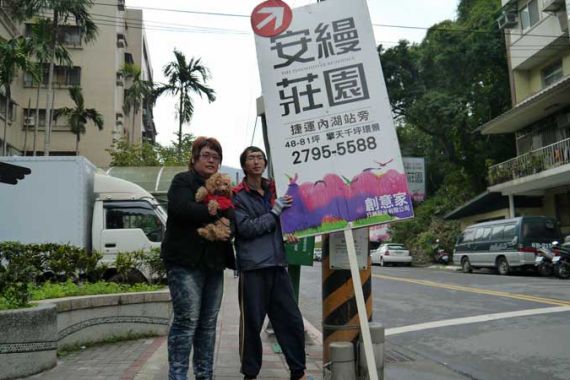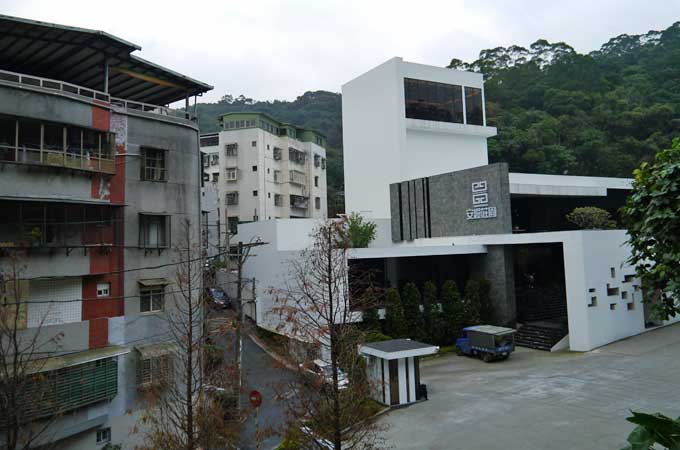Meeting Taiwan’s human billboards
A booming luxury home market marks the deepening divisions between the island’s rich and poor.

Taipei, Taiwan – The tense trio hanging about on a street corner here in the island’s capital somewhat resemble a band of small-time drug pushers – one figure looks out for police under cover of parking cars, while another flashes a billboard to the traffic and hides it in the scrub behind him whenever the lookout indicates. The third, a woman, clings to her miniature dog with one hand and fumbles with a thermos in the other.
The rapid proliferation of human billboards in the streets of Taipei is conspicuous by itself, but what makes it a true phenomenon is that they are all pitching a single product, namely haozhai, the Mandarin Chinese term for luxury apartments.
The wooed buyers are dubbed taishang, the name commonly given to the wives of Taiwanese expats living in China. The luxury home craze has also lifted prices for Taipei’s average homes to staggering heights.
Monthly average earnings in the erstwhile fiercely dynamic Asian tiger state are now down to NT$45,112 ($1,499), which after adjustment for inflation is around the same as the late-1990s level. Unemployment for 20 to 24-year-olds hovers around the 14 percent mark, which is high by East Asian standards.
“The pay is as lousy here as in my last factory job, but there I had to handle all those dreadful metal plates,” says 23-year-old billboard holder Yang Zi-wei, who has just made it through his first week on the job.
“NT$100 ($3.33) an hour, no health insurance, no pension scheme – but no bloody fingers, and my dad, fiancée and dog can all be with me.”
Yang concedes that both his father – the lookout – and fiancée accompany him throughout the day for no pay because the illegality of his new job has the nerves of his loved ones on edge.
Work in progress
The “Aman Manor Pinewhisper Residence” advertised by Yang and men at five other strategic street corner spots has not yet been built.
Over the course of the past year, the developer has demolished a handful of shabby low-rise apartment blocks and erected a fancy model home made of plywood, glass and a few T-beams on site. Project Assistant Manager Tu Wei-ting gives Al Jazeera a tour through the mock facility, careful that the paths of prospective homebuyers who, he maintains, are wandering around, don’t cross each other.
The relatively small units in what next year will be “two star architect-designed” 19-floor towers will sell for between NT$48m and NT$80m ($1.6m and $2.7m). Tu notes the typical buyers will be women over fifty years of age and “very, very rich”. These might be or might not be the wives of taishang, Tu says, “but their husbands are obviously too busy to check the site themselves”.
Stanley Su, a senior researcher with local real-estate broker Sinyi Realty, is positive, however. He said that from 2007 onwards, the taishang, who had originally moved to China to take advantage of an inexpensive labour pool, created the Taipei haozhai boom, as Chinese companies became more competitive, until the cost of manpower and land for factories were no longer as cheap as in China.
 |
| Taipei’s luxury homes are often built next to low-end housing [Jens Kastner/Al Jazeera] |
“They couldn’t go on like before and began carrying their personal wealth back to Taiwan, pumping it into high-end residential real estate,” Su says. “And this had repercussions also for average home prices.”
He said that, unlike many other international metropoli, there is no secluded city suburb exclusively for Taipei’s high-end homes, meaning they are typically right next to their low-end counterparts. “So if a publicised haozhai transaction goes for, say, NT$3m per ping ($100,000 for 3.3sq m), every homeowner of a regular flat in that particular neighborhood would go ahead asking for at least NT$2mn per ping.”
He added that, in a perfect world, no-one should get away with such a naïve market distortion, but that “this is how things work in Taipei”.
Many of the haozhai stay empty, as their owners might spend just a week per year in Taiwan, while the ratio of average house price to average annual income in Taipei is more than twice the international standard.
All eggs in China’s basket
The taishang have played a major role in China’s economic miracle, and it is commonly estimated that they run 70,000 companies in China. Exact figures are not possible to obtain, since many of Taiwan’s China-bound investments are done through third countries, as unification-wary Taiwan tries to constrain the flight of capital, technology and talent across the Taiwan Strait. Economists agree, however, that taishang business activities in China are far in excess of a reasonable scale and thus bring down Taiwanese wages.
“China investments by Koreans and Taiwanese are almost equal in amount, but as Korea’s economy is double the size of Taiwan’s, the China impact on their economy and, in turn, their wages, is only half as significant,” said Hu Sheng-Cheng, an economist at Academia Sinica, one of Taiwan’s most prestigious research institutions.
Even more precarious, Hu says, is that the taishang, unlike their Korean counterparts, operate in a “cost-down mode”, lacking development and innovation, and leaving them ever more vulnerable to cut-throat Chinese competition. The Koreans are in the meantime safely playing in a different league, together with the US and Japan, he argues.
“Taiwanese enterprises have no room for pay rises under these circumstances, either in their Chinese factories or their Taiwan headquarters,” said Hu. “And that labour unions here are nowhere as feisty as in Korea doesn’t help, either.”
Meanwhile, Yang has not been lucky. He was fined NT$1,500 ($50) for “illegal commercial activity in a public space”.
He would have to be a human billboard for another 222 years to own even the smallest unit among the Aman Manor Pinewhisper Residences he advertises.
Yang and his fiancée live in a tiny rented room, costing NT$4,500 ($150) a month. “[I have] never even dreamt of buying a home in a lifetime,” he concluded.